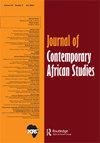Delineating The Image Of Woman Through Akan And Dàgàrà Proverbial Expressions
IF 0.8
Q2 AREA STUDIES
引用次数: 0
Abstract
African Expressive Culture is replete with proverbial expressions which address many subjects as part of cultural identity. Proverbs contain appropriate linguistic features which are suitable ingredients for spicing language. This study takes a critical look at how women are depicted through certain proverbial expressions in the Akan and Dàgàrà traditional societies with emphasis on her personality and character. The main objective of the study is to examine the image of the woman and the kind of personality associated with her in a typically patriarchal cultural environment. Data was gathered from two different cultural communities.Dàgàrà proverbs were gathered between 2004 and 2019 through fieldwork whilst Akan proverbs were gathered through library and internet search. Proverbial expressions which focus on women were selected and analysed using the qualitative approach. The Lakoff-Turner Theory on the Proverb as The Lakoff-Turner Theory on the Proverb as a species of metaphor and Honeck’s affirmation on the cultural context of proverbs undergird this study. Results indicate that the woman is an admirable but vulnerable figure. Her personality reflects that she is a builder and a destroyer in society. This study generates significant debate on how the woman of yesteryear was depicted in the respective societies. It also reveals a pattern of misconceptions about her in the cultural context in which she was depicted.通过Akan和Dàgàrà谚语表达描绘女性形象
非洲表达文化充满了众所周知的表达,这些表达涉及许多主题,作为文化身份的一部分。谚语中含有适当的语言特征,这些特征是为语言增添色彩的合适成分。本研究通过Akan和Dàgàrà传统社会中强调女性个性和性格的谚语,批判地审视了女性是如何被描绘出来的。这项研究的主要目的是研究在一个典型的父权文化环境中,女性的形象和与之相关的个性。数据来自两个不同的文化群体。Dàgàrà谚语是在2004年至2019年间通过实地调查收集的,而阿坎谚语是通过图书馆和互联网搜索收集的。本文采用定性分析的方法,对涉及女性的谚语进行了选择和分析。拉科夫-特纳的谚语理论作为隐喻的一种,以及霍内克对谚语文化语境的肯定是本研究的基础。结果表明,这个女人是一个令人钦佩但又脆弱的人物。她的性格反映了她是社会的建设者和破坏者。这项研究引发了关于过去的女性在各自社会中是如何被描绘的重大争论。它还揭示了在她被描绘的文化背景中对她的误解模式。
本文章由计算机程序翻译,如有差异,请以英文原文为准。
求助全文
约1分钟内获得全文
求助全文
来源期刊

Journal of Contemporary African Studies
AREA STUDIES-
CiteScore
2.20
自引率
0.00%
发文量
18
期刊介绍:
Journal of Contemporary African Studies (JCAS) is an interdisciplinary journal seeking to promote an African-centred scholarly understanding of societies on the continent and their location within the global political economy. Its scope extends across a wide range of social science and humanities disciplines with topics covered including, but not limited to, culture, development, education, environmental questions, gender, government, labour, land, leadership, political economy politics, social movements, sociology of knowledge and welfare. JCAS welcomes contributions reviewing general trends in the academic literature with a specific focus on debates and developments in Africa as part of a broader aim of contributing towards the development of viable communities of African scholarship. The journal publishes original research articles, book reviews, notes from the field, debates, research reports and occasional review essays. It also publishes special issues and welcomes proposals for new topics. JCAS is published four times a year, in January, April, July and October.
 求助内容:
求助内容: 应助结果提醒方式:
应助结果提醒方式:


